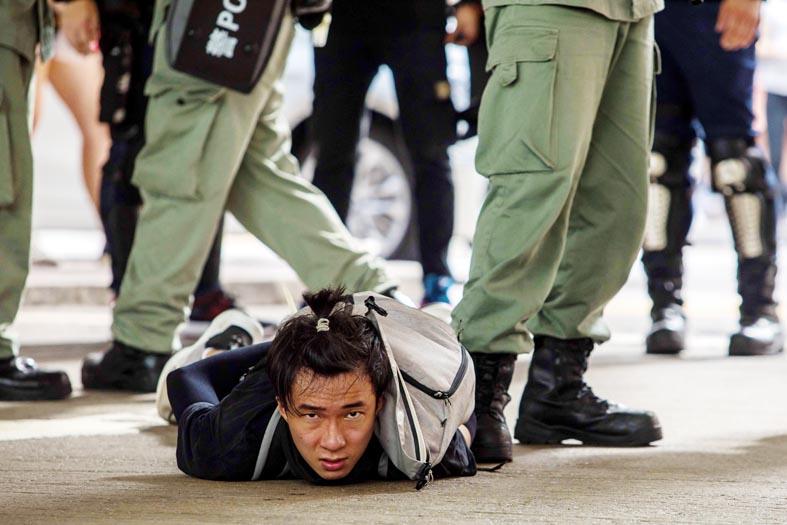The number of Hong Kongers applying for residency in Taiwan skyrocketed 71.7 percent in the first 10 months of the year compared with a year earlier, National Immigration Agency data showed yesterday, as an expert predicted more waves of immigration after the COVID-19 pandemic eases.
In October alone, 1,974 Hong Kongers applied for residency and 128 applied for permanent residency, not only setting a record, but more than doubling the figure from previous months, the agency said.
The number of Hong Kongers applying for residency or permanent residency this year could surpass 10,000, as 8,746 had applied in the first 10 months, already higher than the 7,332 who applied in the whole of last year, it added.

Photo: AFP
Following Hong Kong’s passage of the National Security Law on June 30, the Mainland Affairs Council (MAC) in July opened the Taiwan-Hong Kong Services and Exchanges Office to help Hong Kongers who plan to study, work, invest, start a business or settle in Taiwan.
As of Monday last week, the office had received more than 1,700 inquiries, it said.
Chinese President Xi Jinping (習近平) in his quest for political control has had no qualms about destroying Hong Kong, an expert in cross-strait affairs said.
The territory’s economy contracted 9 percent in the first three quarters of this year, and a lot of foreign investment is preparing to leave, bringing foreign skilled workers and Hong Kongers with economic means along with it, he said.
“Hong Kong cannot go back to how it was before,” as the security law would override everything — even the judges who would dare acquit pro-democracy campaigners, he said.
Under this shroud of fear, more Hong Kongers would want to immigrate to Taiwan, he added.
Although movement is restricted at the moment due to the pandemic, based on the number of inquiries the office has received, he predicted that waves of immigrants would arrive after control measures are eased.
MAC Minister Chen Ming-tong (陳明通) last week told the Legislative Yuan that many Hong Kongers are choosing to settle in New Taipei City’s Tamsui District (淡水).
An official with knowledge of the matter said that cheaper real-estate prices make Tamsui and Linkou District (林口) most attractive to the new arrivals.
Tamsui has become a top choice, as its landscape is reminiscent of Hong Kong island, with real estate at one-eighth of the price, he added.
The shore near the Port of Kaohsiung has also drawn a fair number of transplants, as real-estate and commodity prices are cheaper than in Taipei, the official said.
For an investment visa, applicants only need to invest NT$6 million (US$210,276), less than half of the NT$15 million or more that many other nations require, he said.
However, the most important consideration is Taiwan’s free and open society, he added.

NATIONAL SECURITY THREAT: An official said that Guan Guan’s comments had gone beyond the threshold of free speech, as she advocated for the destruction of the ROC China-born media influencer Guan Guan’s (關關) residency permit has been revoked for repeatedly posting pro-China content that threatens national security, the National Immigration Agency said yesterday. Guan Guan has said many controversial things in her videos posted to Douyin (抖音), including “the red flag will soon be painted all over Taiwan” and “Taiwan is an inseparable part of China,” while expressing hope for expedited “reunification.” The agency received multiple reports alleging that Guan Guan had advocated for armed reunification last year. After investigating, the agency last month issued a notice requiring her to appear and account for her actions. Guan Guan appeared as required,

A Vietnamese migrant worker yesterday won NT$12 million (US$379,627) on a Lunar New Year scratch card in Kaohsiung as part of Taiwan Lottery Co’s (台灣彩券) “NT$12 Million Grand Fortune” (1200萬大吉利) game. The man was the first top-prize winner of the new game launched on Jan. 6 to mark the Lunar New Year. Three Vietnamese migrant workers visited a Taiwan Lottery shop on Xinyue Street in Kaohsiung’s Gangshan District (崗山), a store representative said. The player bought multiple tickets and, after winning nothing, held the final lottery ticket in one hand and rubbed the store’s statue of the Maitreya Buddha’s belly with the other,

‘NATO-PLUS’: ‘Our strategic partners in the Indo-Pacific are facing increasing aggression by the Chinese Communist Party,’ US Representative Rob Wittman said The US House of Representatives on Monday released its version of the Consolidated Appropriations Act, which includes US$1.15 billion to support security cooperation with Taiwan. The omnibus act, covering US$1.2 trillion of spending, allocates US$1 billion for the Taiwan Security Cooperation Initiative, as well as US$150 million for the replacement of defense articles and reimbursement of defense services provided to Taiwan. The fund allocations were based on the US National Defense Authorization Act for fiscal 2026 that was passed by the US Congress last month and authorized up to US$1 billion to the US Defense Security Cooperation Agency in support of the

DAREDEVIL: Honnold said it had always been a dream of his to climb Taipei 101, while a Netflix producer said the skyscraper was ‘a real icon of this country’ US climber Alex Honnold yesterday took on Taiwan’s tallest building, becoming the first person to scale Taipei 101 without a rope, harness or safety net. Hundreds of spectators gathered at the base of the 101-story skyscraper to watch Honnold, 40, embark on his daredevil feat, which was also broadcast live on Netflix. Dressed in a red T-shirt and yellow custom-made climbing shoes, Honnold swiftly moved up the southeast face of the glass and steel building. At one point, he stepped onto a platform midway up to wave down at fans and onlookers who were taking photos. People watching from inside